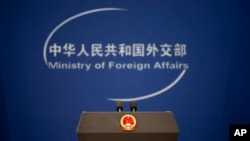China’s foreign ministry Sunday responded to the surprise attack by Hamas militants on Israel by calling on all sides to exercise restraint, echoing Russia’s position.
“China is deeply concerned over the current escalation of tensions and violence between Palestine and Israel. We call on relevant parties to remain calm, exercise restraint and immediately end the hostilities to protect civilians and avoid further deterioration of the situation,” said a spokesperson from China’s Ministry of Foreign Affairs.
“The fundamental way out of the conflict lies in implementing the two-state solution and establishing an independent State of Palestine,” added the spokesperson.
An Israeli embassy official in Beijing Sunday wrote on the social media platform X that Israel expected a stronger condemnation of Hamas by China.
“When people are being murdered, slaughtered in the streets, this is not the time to call for a two-state solution," Yuval Waks who is a senior official at the Israeli embassy in Beijing told reporters on Sunday.
China does not classify Hamas in Gaza as a terrorist group but regards it as a resistance organization.
Israel's Embassy to China also urged Beijing to stand with Israel.
“We also hope that China can provide solidarity and support to Israel at this difficult moment,” it wrote on the social media platform X.
Economic relations between China and Israel have substantially expanded over three decades since both countries established diplomatic ties in 1992, although political disagreements persist. These include divisions over Palestinian-related issues, China's relations with Israel's adversaries, such as Iran, and Israel's security-related concerns regarding specific technology transfers to China.
“China has a strong relationship with Israel, but it is based on Israeli willingness to transfer technology, including military technology, to China. The economic ties are robust, but China and Israel have large diplomatic differences. For example, China maintains a close relationship with Iran. China has always supported the Palestinian cause of its own state and therefore politically opposes many of Israel's policies,” Dennis Wilder, an assistant professor of Asian studies at Georgetown University, told VOA on Sunday.
China has tried to maintain good relations with both Israel and Palestine, so it is unlikely to take sides, according to Bonnie Glaser, managing director of the Indo-Pacific program at the German Marshall Fund of the United States.
Glaser told VOA “Just as in the case of Russia's invasion of Ukraine, Beijing will avoid pinning blame, but instead will simply call for ending hostilities.”
Some critics said China’s response reflects its “self-centered approach” to international politics.
“China wants to be seen as a world power but, as this weak response to clear terrorist actions demonstrates, they consistently fail to act one,” said Retired Rear Admiral Mark Montgomery who is a senior fellow at Washington-based Foundation for Defense of Democracies.
“Because Chinese interests are wrapped in the development of their relationships with Saudi Arabia and the Gulf States, they will not condemn Hamas and express support for Israel unless the Saudis did first, and they did not,” Montgomery added.
Others are skeptical about the prospect that China can mediate an Israeli-Palestinian peace deal. China brokered a Saudi-Iran normalization deal in March.
“China wants to preserve as much flexibility as possible. It may even hold out some hope [unrealistic though it may be] that it might mediate between the two [Israeli-Palestinian peace deal], as it did with Saudi and Iran,” said Aaron David Miller who is a senior fellow at the Washington-based Carnegie Endowment for International Peace.
Taiwan’s Ministry of Foreign Affairs said Saturday in a statement it “vehemently condemns the terrorist and violent attacks” perpetrated by Hamas against Israeli civilians, which has resulted in the loss of innocent lives.
Taiwan President Tsai Ing-wen wrote on X, “On behalf of the people and government of Taiwan, I express my deepest condolences to all those who have been injured or lost loved ones in Hamas’ attack on Israel and Israeli civilians.”




